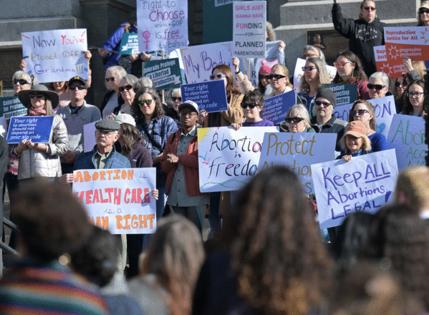Amendment 79 would elevate abortion rights in Colorado to state constitution
Published in Political News
DENVER — Amendment 79 on the state ballot seeks to enshrine access to abortion in the Colorado Constitution. It also would give the green light for public funding to go toward abortion services.
Abortion is now legal statewide at any stage of pregnancy because of protections added to state law by the legislature. Under current law, private insurance companies aren’t obligated to cover the related medical bills, and Health First Colorado, the state’s Medicaid program, pays only if the procedure is lifesaving or if the pregnancy was caused by sexual assault or incest.
Amendment 79 was petitioned onto the ballot by Coloradans for Protecting Reproductive Freedom, a coalition of reproductive rights and progressive advocacy groups.
The measure needs 55% support to pass since it would change the state constitution.
What would Amendment 79 do if passed?
The measure would amend the state’s constitution to guarantee abortion access in Colorado, and it would repeal a 1984 restriction against putting state and local government funding toward abortion services. That would allow the state to add coverage of abortion for Medicaid enrollees and in health insurance plans for state and local government employees — though passage of Amendment 79 would not automatically provide that coverage.
If the measure fails, that prohibition on spending public funds on abortion services would remain in place, and the legislature would retain the authority to decide the state’s abortion laws.
What would it cost?
This has been a point of controversy. The state’s Blue Book voter guide includes an estimate of no fiscal impact directly tied to passage of the measure. But that could change, it notes: “To the extent that additional abortion-related programs are created from allowing the use of public funds for abortion services, state or local government spending will increase. At this time, no change in spending is estimated, as it will depend on future decisions by the state legislature and local governments.”
Groups opposing Amendment 79 have criticized the lack of a fiscal impact projection, including in a federal lawsuit filed last month by Colorado Right to Life. The group argued that the Blue Book was misleading because it’s likely that money collected from taxes would be spent on abortions for Medicaid enrollees and government employees at some point after the measure passes. A judge ruled against the group’s request to halt the printing of the Blue Book.
What do supporters say?
Those in favor of the ballot measure, such as the Colorado Democratic Party, the American Civil Liberties Union of Colorado and Planned Parenthood of the Rocky Mountains, say it would ensure personal freedom of choice and access to health care by protecting abortion services from future decisions made by lawmakers. Advocates say the amendment would also potentially allow workers like firefighters and teachers who are covered by government-provided health insurance to use it for abortions.
What do opponents say?
The opposition, which includes the Colorado Republican Party, Colorado Right To Life and the Truth & Liberty Coalition, contends that the amendment would allow “on-demand abortion for any reason.” They also say its potential passage would mean future legislative restrictions on abortion regarding fetuses and pregnant mothers wouldn’t be permitted.
The Blue Book notes that some opponents say taxpayers should not be forced to pay for abortion services, given that many Coloradans oppose abortion for personal, religious or moral reasons. Opponents also argue the increase in public spending that could result if state and local government leaders decide to cover abortion would put a fiscal burden on taxpayers.
-------
©2024 MediaNews Group, Inc. Visit at denverpost.com. Distributed by Tribune Content Agency, LLC.




























































Comments